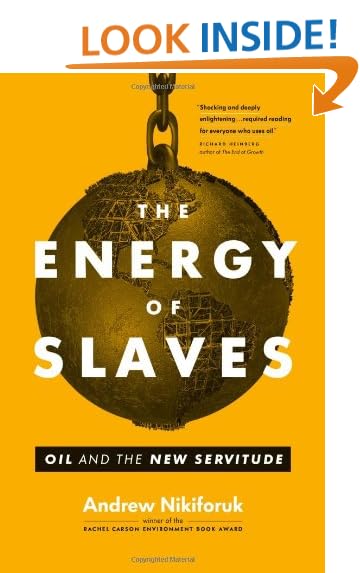I've been reading Andrew Nikiforuk's The Energy of Slaves this week (check out the pop-up interview with him on CBC' radio show The Current) and it has been a great read and an interesting take on the links between the hydrocarbon economy and the slave economy. He also dedicates a chapter to what he calls "The Unsettling of Agriculture": the change from solar to slave to hydrocarbon-based production.
In the chapter on agriculture, he looks at the example of China between the 8th and 12th centuries: during that time, China constructed
...a unique agro-energy empire, diverting enough natural flows of energy to feed nearly half a billion people. It did so by carefully marshaling solar energy in intensely farmed plots of millet and wheat int he north and of rice in the south. Innovations in rice farming--the artificial flooding of land and multiple cropping--tripled the yield of an average peasant family. One square mile of carefully tended land could feed 225 peasants. Peasants hoed, fertilized, and irrigated these highly nutritious crops like some great garden. The land was manured with human shit.But even this system faced problems. As the population grew from 100 million people in the 12th century to 500 million in the 18th, the country inevitably ran into a series of energy and environmental shocks. they ran out of land, and they ran out of wood. The amount of food necessary increased, but the crop surpluses declined. No empire, co government, no country can withstand a collapse in caloric stocks (I've talked about Empires of Food by Fraser and Rimas before (Check out Evan Fraser's discussion here)). the basic structures of Chinese solar energy harvesting remained until the 1970s. This steady-state agriculture finally collapsed under the assault of oil and oil's industrial agriculture programmes--leading to China becoming an ag-product exporter, but, as has been mentioned before in the posts on honey laundering, not one without problems.
We've been through these issues before, too. In 1973, energy analyst Earl Cook pointed out that it was taking 26,745 calories to produce 3,300 kilocalories of food. In 1930, in a manifesto called I'll Take My Stand, a group of southern US farmers said that machines did not emancipate farmers, but in fact evicted them from their farms. In 1943, Sir Albert Howard, in An Agricultural Testament (pdf) pointed out that the replacement of animal traction with mechanical traction came with a significant drawback--mechanical traction doesn't produce urine or manure. he predicted that a people fed on improperly grown food would eventually become dependant on "an expensive system of patent medicines, panel doctors, dispensaries, hospitals, and convalescent homes".
In the end, Andrew Nikiforuk looks at the Cuban experience and takes, as I do, hope from it. Slavery, whether human or hydrocarbon, is a dead end, suitable only for short-term gains, but antithetical to long-term sustainability. The hydrocarbon economy is, at best, a dead-end side road we've mistakenly diverted down. As in the video below, sometimes we discover that the only way to go forward is to move a ways back.
Shaped by Hand from Elias K. on Vimeo.

No comments:
Post a Comment